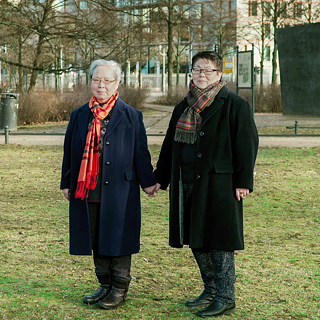„Life Unrehearsed“ – A film by Jieun Banpark
Hello! My name is Jieun Banpark, and I'm the director of the film "Life Unrehearsed," my first feature film. I currently work in Berlin at the Society for Psychosocial Health Promotion among Migrant Groups, particularly from Asian countries (GePGeMi). It's a pleasure to meet you!
The film opens with the words, "It all began with a picture." How did you come across this image, and how did you meet the two protagonists?
In the first scene of the film, you see a picture of two elderly women holding hands. I first saw this picture in 2017 as part of the exhibition "Beyond the Border and the Boundaries"* at the Seoul Museum of History. At the time, I was already living in Berlin, so I initially saw the picture on Twitter rather than in the museum itself. Later, I went through the e-book of the exhibition page by page and experienced it that way. This exhibition was a valuable opportunity to learn about the real lives of the nurses who had gone to Germany—beyond the usual, one-sided image of "angels in white coats" or "key players in obtaining foreign currency." Above all, visitors could learn about the struggles that Korean nurses had to endure in the 1970s. The photo by Tsukasa Yajima in the exhibition left a particularly strong impression on me.
Since I live in Berlin, I had already visited the park where the photo of the two women was taken. The black shape behind them is the memorial to homosexuals persecuted under National Socialism. This memorial is not just a sculpture; it has an unusual structure. If you go closer, you can see a video sequence of same-sex couples kissing through a small window. The fact that we live in the same city and that the two women are standing in such a symbolic place made me very curious. I really wanted to find out the story behind the photo. At that time, I wasn't thinking about making a movie. But as I became more curious about the story of the two women, the vague idea of making a film about it started to take shape.
A Korean activist gave me In-sun's email address, and she was the first person I met. We arranged to meet at a café near their apartment. During our first meeting, In-sun showed me flyers from the groups she is involved with: the Dong Heng Intercultural Hospice Association and a Korean church in Berlin. I then accompanied In-sun to this church, where I met Soohyun for the first time. Despite it being our first meeting, she immediately mentioned they had a crate of beer at home and invited me over without hesitation. I was delighted and went to their house for the first time. That's how I got to know them.
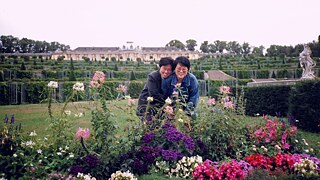
I saw them as older than me, but not as old women. Rather, I admired them because they had experienced so much more in life than I had. I often think that there are hardly any older people in today's world whom I respect and who can be role models for me. I don't think it's just me; many people in their twenties or thirties feel the same way. We lack people who can help us imagine our future. Only a very small group of people are represented in the media. Older lesbians, in particular, are a group that is hardly visible in Korea and worldwide. I felt that this lack of media presence erases their existence, as if they didn't even exist. That's why I wanted to tell the story of these two people living among us. We need to be able to imagine more diverse lifestyles. I wanted the viewers of the film to say, "I could grow old like that." That helps you shape your own future.
In Korea, there are hardly any stories about older members of the LGBTQ+ community. In Germany, there are reportedly a few more, but even there, they are still in the minority compared to stories about the younger generation. What are your thoughts on this?
Whether in Germany or Korea, stories about older people in the LGBTQ+ community have rarely been told. That's why I believe our narratives need to become more diverse. The more diverse our stories, the more varied the lifestyles we can showcase. Even in Korea, before the film "Life Unrehearsed," there were already films featuring older queer individuals in leading roles. Two examples are "Home Ground" (2022, directed by Aram Kwon) and "Troublers" (2015, directed by Young Lee). If you're interested, I highly recommend watching these films.
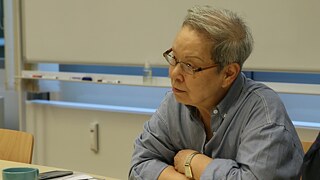
From an external and social perspective, I believe In-sun Kim's award is indeed very significant. However, in the film, I didn't want to list all the past achievements of the main characters but rather focus on what they are doing now. I chose this approach to allow the audience to easily follow the feelings of the two women. I also wanted to highlight the work of the intercultural hospice association that In-sun founded. Even after her retirement, In-sun remains very active, giving talks and writing books.
As a migrant in Germany, I was very interested in her work as the founder of an association for migrants. Many migrants voluntarily participate in the association's courses, which seemed to me to be the main reason for founding the intercultural hospice association. That's why I wanted to showcase this in the film.
This interview centers around the theme of "diversity." I noticed that the documentary also addresses the topic of growing old and dying abroad. Seeing how migrants run a hospice service together surprised me and simultaneously touched and saddened me. Were there any conversations with the hospice team during filming in Berlin that particularly impressed or surprised you?
At the intercultural hospice service Dong Ban Ja, which is featured in the film, volunteers visit and care for people who are at home or in hospice facilities. I was very interested in this work and completed the volunteer training during filming. My interest in the training was partly because I wanted to get closer to my protagonist, In-sun, but mainly because of what friends who had already completed the training had told me. According to them, some of the women who came to Germany from Korea and worked as nurses for many years develop dementia in old age and forget their German. I was shocked that they could work in German all their lives and yet forget their second language. Sometimes, these women think they are speaking German when they are actually speaking Korean. So, I started the training because I was curious about their stories. After the theoretical part, it was time for the practical part, and I was assigned to a Korean man who had also fought in the Vietnam War. He still seemed to understand, but he was bedridden and unable to hold a conversation. The reality was very different from what I had imagined.
In-sun and Soohyun both worked closely with death. After finishing filming, I now understand their attitude towards life better. In-sun often said, "You'll never be as young as you are today. Live in the now." And Soohyun also says in the movie, "You only live once; there is no rehearsal." It occurred to me that these attitudes towards life are all connected. When you've seen death, you understand how valuable the present moment is.
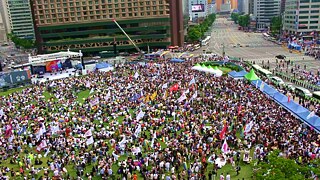
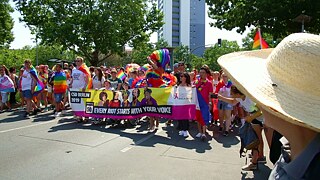
I was already aware of the situation in Korea before filming at the Queer Culture Festival. So, I thought ahead about how to capture the surroundings and context of the festival effectively. In Germany, it would have been nice to include scenes with In-sun at the parade, but I initially focused on accompanying Soohyun with the camera.
When editing the footage, I made sure not to portray any place as better or worse. You can see In-sun in Korea enjoying the festival despite the surroundings, and Soohyun in Germany having fun at the parade and finding it liberating, even though she went alone. It's not shown in the movie, but on the day of the parade, Soohyun met about 10 to 15 colleagues who had worked at the same hospital as her. They participate in the parade in Berlin together every year. There is a gay couple who got married before Soohyun, and the pastor who baptized Soohyun is also a lesbian. In Germany, you often see the rainbow flag in public places like offices, supermarkets, or sports facilities. It symbolizes the sexual minority movement. While it's impossible to know what people really think, you can tell that these places want to show their support for the rights of sexual minorities, at least outwardly.
I left Korea nine years ago, so I can't speak specifically about the current situation there. However, I've seen critical comments in articles about the movie from people who haven't even watched it, simply because it's a queer film. What hurt me the most were comments claiming that the Bible describes homosexuality as a sin.
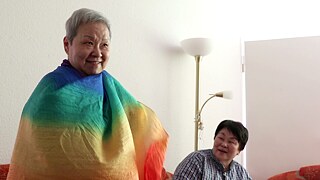
The title was first set in Korean and then in English. In the movie, In-sun says during a lecture, "I have to take care of myself first; only then can I spend time on other people." The movie is a love story about two people, and these words are deeply meaningful to me. The fact that they each existed independently but respected each other was why they were able to stay together for so long. Soohyun says, "You only live once, so I live for myself. There is no rehearsal in life." Everyone does what they can. All these statements reflect the couple's attitude toward life and their values. The Korean title was the producer's idea, and the English title was suggested by the translator.
"Life Unrehearsed" might be uncomfortable for some viewers, while others will surely enjoy it. Is there anything you'd like to share with the audience? Can you tell us about the reactions since the film was released?
I was very surprised that the movie could make viewers uncomfortable—just because of the queer theme? I also saw vulgar, critical comments under online articles and worried that the two protagonists could be hurt by such remarks. When I was making the movie, the story of the two main characters was the one I wanted to see the most. That's why I threw myself into working on it. I hope viewers find comfort through the film. Many close friends and acquaintances of mine have already passed away, but our lives aren't simply switched off like a computer. Just as these two people are here, the lives of the viewers will continue. That's what I want them to take away. Media can help us imagine many different life paths, and I hope this film becomes a part of that.
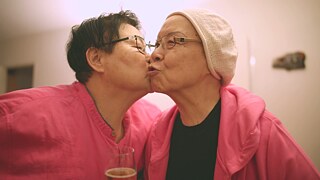
These two people have broadened my world. Seven years have already passed since I met them. Before making this film, I hardly thought about getting older and didn't realize how important the topic of "care" is. Through them, I discovered a new perspective on life.
Discrimination and equality aren't lofty concepts; they're always present because all people are equal. No one should discriminate or be discriminated against based on certain characteristics. I believe we must adhere to this principle so we can meet one another as human beings.
P.S.: The love story of the two older women has become very public through the movie. Have In-sun Kim and Soohyun Lee received unexpected congratulations or faced new difficulties?
When I talk to viewers, they always ask how the two of them are doing. They may not be as fit as they used to be, but they still go for daily walks and take care of their health. The most interesting thing about the audience discussions was that viewers wanted to hear answers to their life questions from the two women, almost like a life counseling session. For example, they asked how to handle arguments as a couple, how to deal with difficulties during an upcoming stay abroad, or how to forgive family members.
There were also many reactions like, "Now I can imagine my old age," "Now I can imagine my future," or "I'd like to grow old like that too." You could feel that the audience wished them both good health for a long time to come and drew hope and inspiration from their lives.
